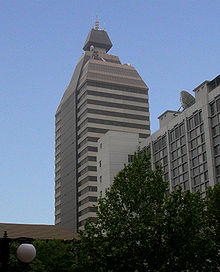Xinhua News Agency
![]()
The title of this article is ambiguous. For other meanings, see Xinhua (disambiguation).
Xinhua (IPA: [ɕín.xwǎ]; Chinese 新華通訊社 / 新华通讯社, pinyin Xīnhuá Tōngxùnshè, short 新華社 / 新华社, Xīnhuá shè - "New China News Agency") is the news agency of the government of the People's Republic of China and the larger of the country's two news agencies (the other is China News Service).
Xinhua provides the country's mass media with the news as defined by the Chinese Communist Party and the Chinese central government. It is the news monopolist of the People's Republic and can dictate to all newspapers and radio stations what news can be published. Its board is a member of the Central Committee of the Communist Party of China, and it is directly subordinate to the State Council.
Xinhua is thus the largest and most influential media organization in China, operating more than 170 foreign bureaus and 31 bureaus in China - one for each province, plus a military bureau. Among other things, it produces the globally distributed news channel CNC World.

Xinhua logo

Headquarters of the Xinhua news agency in Beijing
History
Xinhua was founded in 1931 in the Ruijin Soviet Zone and later moved its headquarters to Beijing. Xinhua was also established as a publishing house, which today publishes more than 20 newspapers and a dozen magazines, and publishes in eight languages (Chinese, English, Spanish, French, Russian, Portuguese, Arabic and Japanese).
On the Tiananmen Square massacre in 1989, Xinhua's staff struggled to find an "appropriate line" for coverage. Although Xinhua was more cautious than the People's Daily in its coverage of issues unpleasant to the government during this period-such as the commemoration of the death of reformist Communist Party leader Hu Yaobang in April 1989 and the subsequent demonstrations in Beijing and elsewhere-Xinhua reported favorably on protesters and intellectuals who supported the democracy movement. The conflict between journalists and top editors over censorship in the Tiananmen Square crackdown lasted several days after the military-the People's Liberation Army-violently broke up the protests on June 4. Some journalists went on strike and demonstrated at the Xinhua Agency headquarters in Beijing. After the massacre, government oversight of the media increased - editors at Xinhua bureaus in Hong Kong and Macau were replaced by candidates loyal to Beijing.
In 2020, Xinhua, as a state-run news agency, selectively spread conspiracy theories and misinformation about the COVID-19 pandemic via Facebook and Instagram ads and Twitter posts, blaming US President Donald Trump.
Critique
Xinhua has been criticized by international media for promoting propaganda, racism, and hate speech against opponents of the Chinese Communist Party. Due to media censorship in China, Xinhua remains the main source for smaller news publications and thus there is a conflict of interest between the Communist Party and the news agency. Reporters Without Borders calls Xinhua the largest propaganda agency in the world. A report states that the news agency is "at the heart of government-imposed censorship and disinformation."
In an interview with Indian media in 2007, the then head of Xinhua, Tian Congmin, acknowledged the problem of so-called "historical defeats and popular perceptions." Newsweek criticized Xinhua as "known for its blind spots" on controversial news in China, mentioning, for example, that its "coverage of the United States is not fair and balanced."
Search within the encyclopedia